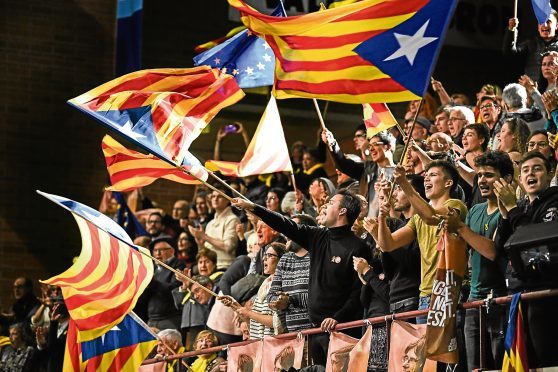History walks the streets of Barcelona this morning. Catalans go to the polls in a make-or-break vote – if nationalist parties win, then independence for the region looks inevitable. That would have consequences for Spain, the EU and for Scotland.
In October the Catalan regional government held a referendum for independence. Two million people voted yes but the vote was illegal under Spanish law and less than half of Catalans cast a ballot.
What seemed slightly self-indulgent turned into something else when Spanish police were recorded hitting voters while trying to close the vote down – Catalonia became a victim and an international issue.
Madrid dismissed the referendum, dissolved the Catalan government and brought charges against many of the political and civic leaders who had staged the vote.
A snap election was called for today to find a new regional government, and it has also become an unofficial referendum on independence.
The stakes could not be higher for Spain and the EU, who have both presented Catalan demands as an attack on the state and European unity.
If Catalonia says yes to nationalist parties, then Spain will find it near-impossible to resist another, legal referendum. Brussels would have to endorse that new vote, even if it kept up the line that Catalonia cannot join the EU.
This would be occurring while Brexit is being negotiated and would present an existential crisis for the European Union – further evidence that voters want something different to the old structure.
This year the Scottish Government called a second independence referendum, and then dropped the idea after a bad election result.
Catalan independence would set an example for Scotland, where many voters feel angry about a Brexit they didn’t vote for. This could establish ideas about borders, currency and legitimacy which would fundamentally affect the Scottish discussion.
However, Catalonia is not in a fever for freedom. Opinion polls show a race too close to call. Since October, big businesses have been relocating to other parts of Spain and Barcelona itself is likely to vote for unity with Madrid. The nationalist parties were alarmingly unprepared for the consequences of the October referendum, some going to jail while others fled for Belgium.
On the eve of the vote, Oriol Junqueras, the leader of the largest nationalist group, ERC, reportedly took a swipe at the other nationalist leader, Carles Puigdemont of the Catalan Democratic Party (also known as the JxCat party). The imprisoned Junqueras told a radio journalist he was in jail “to face the consequences” and that he “didn’t run away from my actions”. Puigdemont escaped jail by secretly moving to Belgium, having refused to declare independence in his last speech to parliament.
Catalan nationalism is a strange creature, as Catalonia was never a nation and has a lot of regional powers. Catalans harbour a historic distrust of Madrid from the Civil War of 1936-39 and the pro-Madrid discrimination by the dictator General Francisco Franco, who ruled Spain from 1939 to 1975. There is also an economic grudge, that rich Catalonia distributes money to other regions when it could be tackling issues such as unemployment at home.
The threat from Spain is not entirely subjective. Further powers were to be devolved in 2016 but Madrid withheld them, which led to the pressure for an independence referendum.
Barcelona this morning is either the beginning of a new European revolution, demanding greater layers of democracy and breaking up the old Europe of big states, or the death knell of an independence movement high on emotion but vague on detail.
The votes do not traditionally take long to count but the result can often be unclear as parties negotiate to form coalitions. There are seven main parties contesting the election.
The Republican Left of Catalonia (ERC) is leading the polls and is the mainstream nationalist party, led by Oriol Junqueras. Junts per Catalunya (JxCat) is a new coalition for this vote, including Carles Puigdemont’s Catalan Democratic Party.
The Popular Unity Candidacy party is also for independence but, like SNP fundamentalists, would withdraw from the EU and Nato. There are three unionist parties: Ciudadanos, the Socialists’ Party of Catalonia and the People’s Party. Finally, Catalonia In Common is a grouping of radicals including Podemos and the Greens who contest this vote unaligned on the independence question.
Catalans cast one vote for a party list. The votes are counted in the four provinces of Catalonia and seats are won when a party has at least 3% of support. The kink in the system is that pro-union Barcelona gets fewer seats per votes than other parts of the region, which is why in the last election nationalist parties won 48% of the overall vote, but gained more seats than rival parties and formed the government.
